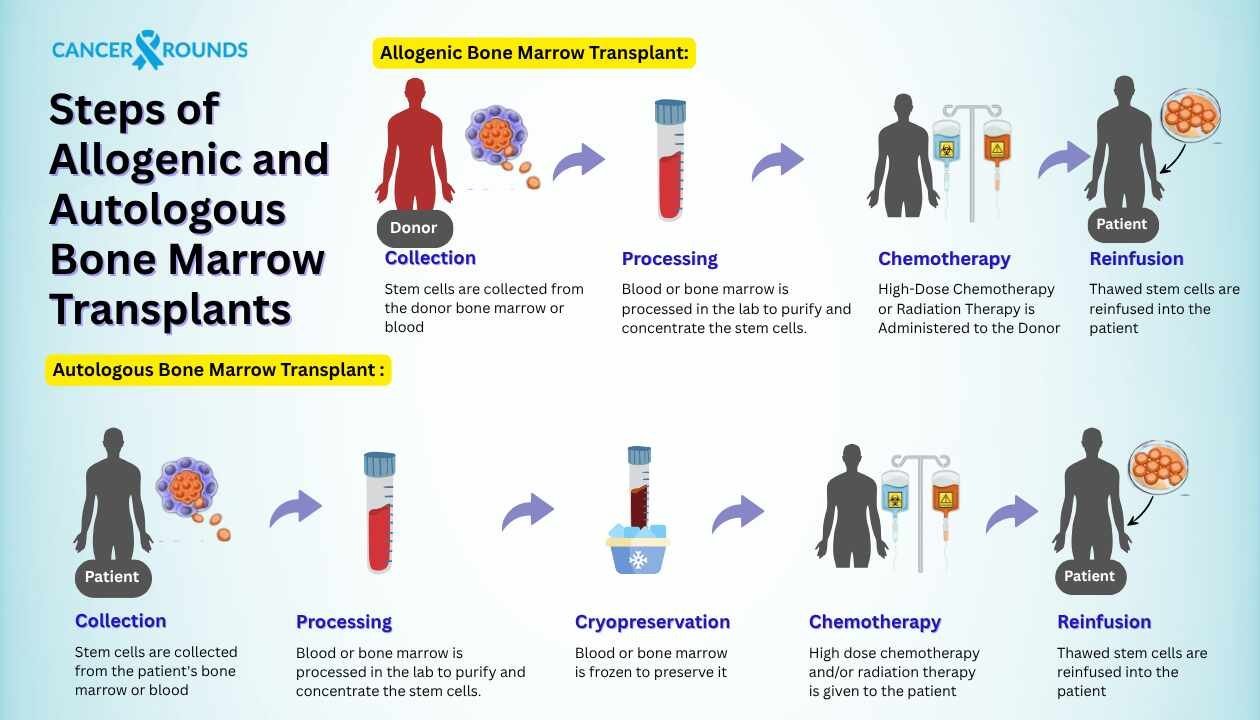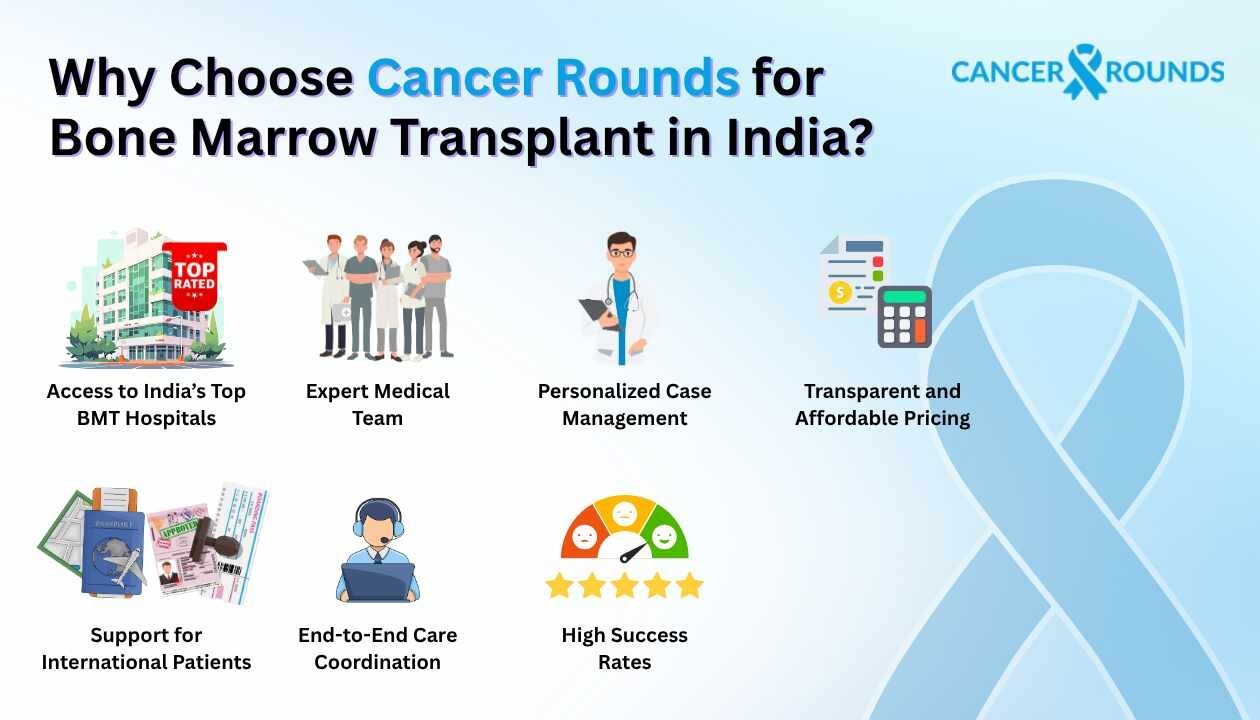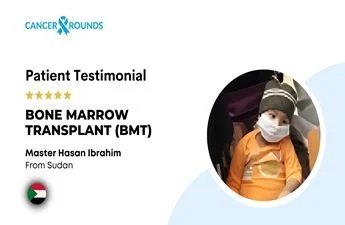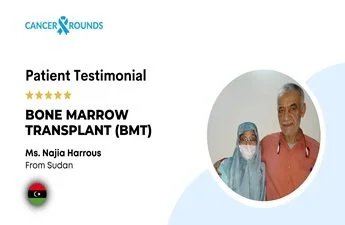Bone Marrow Transplant Cost In India
A bone marrow transplant (BMT) is a specialized medical procedure used to treat patients with certain cancers, blood disorders, or immune system conditions. It involves replacing damaged or diseased bone marrow with healthy blood-forming stem cells. These stem cells may come from the patient’s own body (autologous transplant) or from a suitable donor (allogeneic transplant).
This procedure helps restore the body’s ability to produce healthy blood cells, which is critical after intensive treatments like chemotherapy or radiation.
On an average, Bone marrow treatment cost in India ranges from INR 8 lakhs to 40 lakhs (approximately USD 20,000 to 55,000), depending on factors such as the type of transplant, hospital facilities, post-transplant care, and the patient’s medical condition.
Types of Bone Marrow Transplants and Their Costs in India
Understanding the types of bone marrow transplants and their respective costs is crucial for patients seeking treatment in India. The bone marrow transplant cost in India varies depending on the type of procedure, donor availability, and the complexity of the case.
- An autologous bone marrow transplant, where the patient’s own stem cells are collected and reinfused after chemotherapy or radiation, is generally the most cost-effective option. The cost of an autologous transplant in India typically ranges from INR 8 to 15 lakhs, which is approximately USD 10,000 to 18,000.
- An allogeneic fully matched bone marrow transplant, which uses stem cells from a fully HLA-matched donor (usually a sibling or an unrelated matched donor), involves a more complex process and post-transplant care. In India, the cost for this procedure usually ranges from INR 18 to 25 lakhs, or about USD 22,000 to 30,000.
- A more advanced option is the allogeneic haploidentical (half-matched) bone marrow transplant, where the donor is only a partial match—commonly a parent, sibling, or child. This type of transplant requires specialized care and facilities, and the cost in India generally falls between INR 25 to 40 lakhs, or roughly USD 30,000 to 55,000.

Below is the list of some of the diseases or disorders that may require bone marrow transplant:
- Aplastic anemia
- Neuroblastoma
- An inherited blood disease
- Thalassemia
- Bone marrow cancers like leukemia, multiple myeloma, and lymphoma
- Sickle Cell Disease
Note: These are estimated costs. Actual expenses may vary based on individual case complexity, hospital policies, and post-transplant care needs.
Cost Comparison of Bone Marrow Transplant in Different Cities in India
| City | Estimated Cost (INR) | For International Patient (USD Cost) |
| Bone Marrow Transplant Cost in Delhi NCR | ₹8,00,000 – ₹40,00,000 | $11,875 – $59,375 |
| Bone Marrow Transplant Cost in Mumbai | ₹16,50,000 – ₹44,00,000 | $24,375 – $65,000 |
| Bone Marrow Transplant Cost in Chennai | ₹15,00,000 – ₹40,00,000 | $21,875 – $59,375 |
| Bone Marrow Transplant Cost in Bangalore | ₹14,25,000 – ₹42,00,000 | $20,950 – $62,500 |
| Bone Marrow Transplant Cost in Noida | ₹9,00,000 – ₹38,00,000 | $13,125 – $56,250 |
| Bone Marrow Transplant Cost in Gurgaon | ₹10,00,000 – ₹39,00,000 | $14,750 – $58,125 |
| Bone Marrow Transplant Cost in Hyderabad | ₹13,00,000 – ₹38,00,000 | $19,375 – $56,250 |
| Bone Marrow Transplant Cost in Kolkata | ₹12,00,000 – ₹36,00,000 | $17,875 – $53,750 |
These prices reflect average treatment costs and may vary depending on:
- Type of transplant (autologous, allogeneic, haploidentical)
- Hospital and city infrastructure
- Donor matching and availability
- Post-transplant care requirements
Comparison of Bone Marrow Transplant Cost with Different Countries
The cost of a bone marrow transplant in India is significantly more affordable compared to most Western countries, without compromising on medical quality or outcomes.
| Country | Estimated Cost (Local Currency) | Estimated Cost (USD) |
|---|---|---|
| India | ₹15,00,000 – ₹40,00,000 | $18,000 – $50,000 |
| Nigeria | ₦20,000,000 and above | $50,000 and above |
| Pakistan | PKR 4,000,000 and above | $20,000 and above |
| USA | $300,000 – $800,000 | $300,000 – $800,000 |
| UK | £150,000 – £300,000 | $190,000 – $380,000 |
| Germany | €200,000 – €350,000 | $220,000 – $380,000 |
| Thailand | THB 2,000,000 – THB 3,500,000 | $55,000 – $95,000 |
| Turkey | TRY 800,000 – TRY 1,500,000 | $45,000 – $80,000 |
| UAE (Dubai) | AED 250,000 – AED 500,000 | $70,000 – $135,000 |
Doctors For Bone Marrow Transplants
Need More Recommendations ?
Factors Affecting Bone Marrow Treatment Cost in India
The cost of bone marrow treatment in India can vary widely depending on multiple medical and logistical factors. Understanding these factors helps patients and caregivers plan more effectively and avoid unexpected expenses.
1. Type of Transplant
The type of bone marrow transplant plays a major role:
- Autologous Transplant (using the patient’s own stem cells) is generally more affordable.
- Allogeneic Transplant (using a donor’s stem cells) is more complex and costly.
- Haploidentical or Mismatched Transplants require advanced technology and longer hospital stays, further increasing the cost.
2. Donor Matching & Availability
The process of finding a matched donor, especially from unrelated registries, can be expensive. HLA typing, donor screening, and graft preparation contribute to the cost.
3. Hospital Infrastructure & Location
- Private hospitals in metro cities like Mumbai, Delhi, and Bangalore tend to charge more due to higher operational costs and advanced facilities.
- Government or charitable hospitals may offer the same procedures at subsidized rates.
4. Duration of Hospital Stay
Patients undergoing a bone marrow transplant may need to stay 3–6 weeks or longer in a sterile environment. Extended ICU stays, isolation wards, and follow-up visits increase overall expenses.
5. Medications & Supportive Care
Post-transplant care includes:
- Immunosuppressants
- Antibiotics
- Antifungal and antiviral drugs
These medications can significantly raise the cost, especially if complications occur.
6. Pre-Transplant Evaluation
Diagnostic tests such as:
- Complete blood count (CBC)
- Bone marrow biopsy
- CT scans and organ function tests are necessary and add to the total treatment cost.
7. Complications and ICU Support
Infection, graft-versus-host disease (GVHD), or organ dysfunction may require intensive care or extended hospitalization, increasing both risk and expense.
8. International vs. Domestic Patients
International patients may incur additional costs for:
- Travel and accommodation
- Interpreter services
- Visa and documentation support
Some hospitals also offer “international patient packages,” which may be priced higher.
How the Procedure Works:
- Pre-transplant Evaluation: Includes blood tests, imaging, and tissue matching.
- Conditioning Regimen: High-dose chemotherapy (and sometimes radiation) to destroy diseased cells.
- Stem Cell Infusion: Healthy stem cells are infused intravenously.
- Engraftment and Recovery: The new stem cells travel to the bone marrow and begin producing new blood cells.
When Is Bone Marrow Treatment Recommended?
Doctors recommend bone marrow transplants when:
- Standard treatments (like chemotherapy) are not effective.
- There is a high risk of relapse.
- The disease is inherited or affects blood production directly.
Recovery and Aftercare
Recovery may take several weeks to months. During this time, patients need:
- Strict infection control
- Immunosuppressive therapy
- Regular monitoring of blood counts and organ function
Risks and Complications
While BMT can be curative, it comes with risks such as:
- Graft-versus-host disease (GVHD)
- Infections
- Organ complications
- Delayed immune recovery
Complications During Bone Marrow Transplant
Bone marrow transplantation is a complex procedure and may involve short-term or long-term complications. Common early symptoms include:
- Fever
- Headache
- Drop in blood pressure
- Nausea or vomiting
- Bone or joint pain
These side effects are generally temporary and manageable, often depending on the patient’s age, immune status, and medical history. However, in some cases, more serious complications like Graft-Versus-Host Disease (GVHD), infections, or organ damage can occur, requiring intensive medical care.
5 easy Steps to Get Treated in India

Share Case Details

Get Expert Opinion and Hospital Quotes

Get Visa Invitation & Hotel Recommendations

Get Received At Airport and Start Your Treatment

Travel Back and Get Followups Through Us
Why India Is Becoming a Global Hotspot for Bone Marrow Transplantation
India has rapidly become a preferred destination for bone marrow transplant (BMT) due to a combination of affordability, medical excellence, and global accessibility.
1. Affordable Bone Marrow Transplant Cost
- Bone marrow transplant cost typically ranges from ₹15,00,000 to ₹40,00,000 ($18,000–$50,000), significantly lower than in countries like the USA or UK.
- The value of the Indian Rupee against the Dollar, Pound, or Euro makes treatment highly cost-effective for international patients.
2. World-Class Hospitals
- India is home to accredited hospitals (NABH, JCI) offering advanced transplant facilities.
- These hospitals provide high-end surgical infrastructure, HEPA-filtered transplant units, and personalized post-transplant care.
3. Expert Doctors
- Indian doctors for BMT are internationally trained, experienced in complex transplant cases, and deliver care on par with Western countries—at a fraction of the cost.
- Many oncologists and hematologists are affiliated with leading global research institutions.
4. High Success Rate
- The success rate of bone marrow transplants in India has risen to nearly 90% in recent years, especially in elective, well-matched transplants.
- Enhanced post-operative care, early diagnosis, and improved immunosuppressive protocols contribute to these outcomes.
5. Availability and Options
- Patients can choose from a wide network of public and private cancer centers, offering flexibility based on medical needs and budget.
- All types of BMT—autologous, allogeneic, haploidentical—are available with cutting-edge technology.
Advantages of Bone Marrow Transplantation (BMT)
A BMT offers multiple therapeutic benefits:
- Replaces diseased bone marrow with healthy, functional marrow.
- Regenerates a new immune system to fight cancers like leukemia and lymphoma.
- Restores normal blood cell production after high-dose chemotherapy or radiation.
- Helps treat genetic disorders like thalassemia or sickle cell anemia.
- Offers a curative pathway for conditions resistant to conventional therapy.
How Successful Is Bone Marrow Transplant in India?
- India’s BMT success rates are among the highest in the world, especially for pediatric cancers, aplastic anemia, and blood cancers.
- Hospitals report engraftment success within 2–3 weeks for most autologous cases and long-term disease remission in a majority of patients.
India is considered one of the most reliable and cost-effective countries for undergoing this complex treatment.
Best Bone Marrow Transplant Hospitals in India
The following hospitals offer bone marrow transplant (BMT) services with high success rates, advanced medical technology, and internationally accredited facilities. Each hospital features dedicated hematology and oncology departments, staffed by highly experienced transplant specialists.
Here is a curated list of some of the most trusted bone marrow transplant hospitals in India, spread across key medical hubs:
Top Bone Marrow Transplant Hospitals in Delhi NCR
- AIIMS, New Delhi
- Apollo Hospitals, Indraprastha, New Delhi
- Medanta – The Medicity, Gurugram
- Fortis Memorial Research Institute, Gurugram
- Artemis Hospital, Gurugram
- Max Super Specialty Hospital, Saket, New Delhi
Top BMT Hospitals in Mumbai
- Tata Memorial Hospital, Parel
- Kokilaben Dhirubhai Ambani Hospital
- Lilavati Hospital
- Fortis Hospital, Mulund
- Jaslok Hospital
Top BMT Hospitals in Bangalor
- Manipal Hospital, Old Airport Road
- HCG Cancer Centre
- Narayna Health (Mazumdar Shaw Cancer Centre)
- Apollo Hospitals, Seshadripuram
- Aster CMI Hospital
Top BMT Hospitals in Chennai
- Apollo Hospitals, Greams Road
- MIOT International Hospital
- Sri Ramachandra Medical Centre (SRMC)
- SIMS Hospital
Top BMT Hospitals in Hyderabad
- Apollo Hospitals, Jubilee Hills
- Yashoda Hospitals, Secunderabad
- Basavatarakam Indo-American Cancer Hospital
- KIMS Hospitals
- Continental Hospitals, Gachibowli
To get a consultation from the best oncologists and hematologists, contact us and our team will get back to you in less than 24 hours.
Why Choose Cancer Rounds for Bone Marrow Transplant in India?
Cancer Rounds is a trusted name in cancer care, offering comprehensive and personalized support to patients undergoing complex treatments like bone marrow transplants (BMT) in India. With a strong network of top hospitals, renowned hematologists, and a patient-first approach, Cancer Rounds stands out as a reliable partner in your treatment journey.

1. Access to India’s Top BMT Hospitals
Cancer Rounds is partnered with NABH and JCI-accredited hospitals across major cities like Delhi NCR, Mumbai, Bangalore, Chennai, and Hyderabad. These facilities are equipped with state-of-the-art bone marrow transplant units, ICU support, and sterile environments for optimal recovery.
2. Expert Medical Team
We connect you with some of India’s most experienced hematologists, oncologists, and bone marrow transplant specialists, ensuring you receive evidence-based, globally approved treatment protocols.
3. Personalized Case Management
Every patient is assigned a dedicated medical advisor who helps with:
- Selecting the right hospital and doctor
- Understanding treatment options
- Arranging second opinions if needed
- Tracking medical progress
4. Transparent and Affordable Pricing
Cancer Rounds ensures cost transparency, helping patients navigate expenses clearly.
5. Support for International Patients
For patients coming from abroad, we offer complete medical tourism support, including:
- Visa assistance
- Airport pickup
- Interpreter services
- Accommodation and travel help
6. End-to-End Care Coordination
From diagnosis to BMT recovery, we manage every step of your journey. Post-transplant care and long-term monitoring are arranged to ensure continued success and peace of mind.
7. High Success Rates
Our partner hospitals report competitive BMT success rates, especially in treating conditions like leukemia, lymphoma, thalassemia, aplastic anemia, and multiple myeloma.
You May Be Also Interested In
All Cost Pages
Related Patient Stories

Our son had relapsed leukemia. Thanks to Cancer Rounds & Fortis, he got the right treatment and a second chance at life. Forever thankful.

India gave me hope and healing. With Cancer Rounds by my side, I overcame CLL through a bone marrow transplant. Forever grateful for this journey.
Our Impact
CancerRounds is making quality cancer care accessible to more people every day.




Why Choose India for Cancer Treatment?

World-Class Care
Skilled oncologists provide top-tier medical services

Affordable Treatment
Costs are significantly lower than in Western countries.

Comprehensive Packages
Hospitals offer all-inclusive plans covering surgery, stay, and aftercare.

Easy Accessibility
Well-connected airports and international flight routes.

Proven Success
High patient satisfaction and positive treatment outcomes
Thank You!
Your form has been submitted successfully.





 Chat on WhatsApp
Chat on WhatsApp